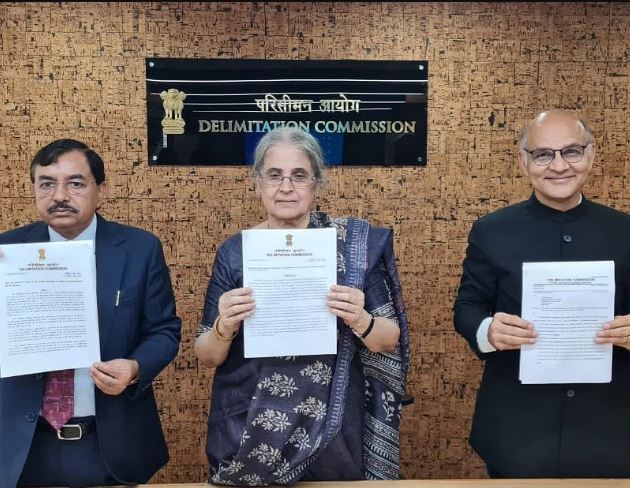New Delhi: The Delimitation Commission on Jammu and Kashmir, formed in March 2020, Thursday notified its final report giving six additional Assembly seats to Jammu region and one to Kashmir Valley and bringing areas of Rajouri and Poonch under the Anantnag parliamentary seat.
Jammu division will now have 43 assembly seats and Kashmir 47 in the 90-member house.
“The changes will come into effect from the date to be notified by the central government,” the Commission said in a statement.
With this report having been notified, decks are now cleared for holding of the first assembly elections in Jammu and Kashmir after it was downgraded to a union territory on August 5, 2019.
Earlier, the erstwhile assembly had 87 seats — 46 in Kashmir, 37 in Jammu 37 and four in Ladakh.
Ladakh, in the reorganisation of the erstwhile state, was declared as a union territory without an assembly.
A gazette notification was issued after the three-member panel headed by Justice Ranjana Prakash Desai, a retired Judge of the Supreme Court of India, signed the final order before submitting it to the government. The other two ex-officio members were Chief Election Commissioner Sushil Chandra and Jammu and Kashmir Election Commissioner K K Sharma.
Five Lok Sabha members — three from the National Conference and two from the BJP — were Associate members to the Commission.
The report was later submitted to the Union Law Ministry.
While no seat has been reserved by either Kashmiri migrants or refugees from West Pakistan, the Delimitation Commission said that it would recommend to the government for providing at least two seats including a female from the community of Kashmiri migrants in the Legislative Assembly at par with the power of nominated members of the Puducherry Assembly under which a member has a right to vote.
The Commission, which was entrusted with the work of delimiting the assembly and parliamentary constituencies in the UT of Jammu and Kashmir on the basis of the 2011 Census, has also recommended to the government to consider giving the displaced persons from Pakistan-occupied Jammu and Kashmir some representation in the assembly through nomination.
The population of Jammu region is 53.72 lakh and Kashmir division 68.83 lakh, according to the Census of 2011.
Out of the 90 assembly constituencies, nine have been reserved for Scheduled Tribe — six in Jammu and three in the Valley.
Reacting to the report, the National Conference said, “We have seen the final recommendations of the Delimitation Commission. We are studying the implications of these recommendations for individual assembly constituencies.”
“No amount of gerrymandering will change the ground reality which is that whenever elections are held the voter will punish the BJP and its proxies for what they have done to JK over the last 4 years,” the party said.
The People’s Conference sought to put the blame on the National Conference for the development. “We are not saying that had they not participated there would have been no delimitation and that the process would have been stalled. But the process would not enjoy the sanctity that they enjoy now,” the party said in a statement without naming the NC.
“The delimitation report is a repeat of the past. Same traditional entities are calling the shots behind the scenes. Kashmir has been discriminated against as in the past. No change. Only the degree of disempowerment is greater,” the party said in a statement.
The National Conference MPs, in their capacity of associate members, attended only one meeting of the Commission in December last year.
PDP president Mehbooba Mufti said that there was nothing more to add as “we have always maintained that the Delimitation Commission was meant only to execute political game plan of BJP in Jammu and Kashmir and divide people on communal lines”.
The Commission said in a release that the delimitation process was a “challenging task” because of its “peculiar geo-cultural landscape” that presented unique issues arising due to factors like competing political aspirations, vast differences in population density between districts, existence of sub-regions within certain districts, uncertainty of life and inadequate availability of connectivity and public conveniences in villages along the International Border prone to unprovoked intermittent firing/shelling in the border districts.
Ignoring pleas of regional political parties of not joining Rajouri and Poonch in Jammu region with the Anantnag parliamentary seat, the Commission said that it had ensured that every Lok Sabha seat will have 18 assembly seats each.
The regional political parties had opposed joining Rajouri and Poonch areas of Jammu with Anantnag in South Kashmir on the plea that these areas were geographically quite far away.
Both the areas are 160 km from Anantnag via Mughal Road which remains cut off during winter months due to heavy snow.
Names of some assembly seats have been changed keeping in view the demand of local representatives and public sentiment.
Tangmarg has been renamed as Gulmarg assembly seat, Zoonimar as Zaidibal, Sonwar as Lal Chowk, Padder as Padder-Nagseni, Kathua North as Jasrota, Kathua South as Kathua, Khour as Chhamb, Mahore as Gulabhgarh, Darhal as Budhal.
The Commission was set up in March 2020 after the passage of the Jammu and Kashmir Reorganisation Bill in Parliament in August 2019 and was asked to complete its work within a year which was extended by a year due to COVID-19.
It was granted another extension of two months and its term was to end Friday.
Prime Minister Narendra Modi, during a meeting with Jammu and Kashmir leaders on June 24 last, had said the ongoing delimitation exercise has to happen quickly so that polls can be held to install an elected government that gives strength to its development trajectory.
PTI
